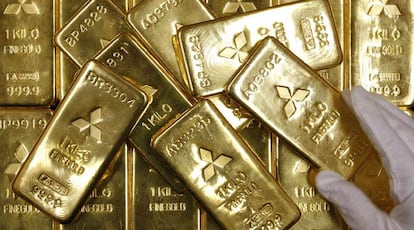The price of gold dances to a geopolitical tune
The war in the Middle East spotlights the value of precious metals as safe havens for investors

Throughout history, gold has captivated humans. Initially used for jewelry and decoration, it later found its place in industry, as a store of value (the renowned gold standard), and more recently as a speculative investment asset. This precious metal has consistently acted as a gauge of fear in financial markets. Even today, it remains a safe haven for money.
In August 2020, the price of gold reached its historical maximum of $2,063 per ounce due to the impact of the Covid-19 pandemic on the world economy. The price of gold has now surged again, not because of a deadly virus but due to the war between Hamas and Israel. Since the October 7 Hamas attack on Israel, the price of gold has risen 9% and is currently trading at $1,991 per ounce. Analysts predict that the Middle East conflict and its global implications may keep gold prices at current levels, with potential for historical highs if the conflict expands.
“Gold has had a long history of being a geopolitical hedging instrument and has performed true to its reputation. Gold responded strongly to the Russia-Ukraine War in February 2022 and is currently moving higher due to the Israel-Gaza War,” says Nitesh Shah, head of commodities at WisdomTree, a fund management company. “Gold, however, is holding its own, with the yellow metal continuing to defy the historic real yield-gold relationships.” The outlook for the metal is bullish in the event of a recession, financial disruption or war escalation.
During turbulent times, gold has consistently delivered impressive returns. According to WisdomTree, following the bankruptcy of Lehman Brothers that triggered the global financial crisis, gold returned 31.5% compared to the S&P 500 stock index’s 4.4% gain. Similarly, after the September 11 attacks, gold rose 17% while equities fell 15%. In the Yom Kippur War, these trends were even more pronounced: gold appreciated by 47% while S&P 500 stocks collapsed by 42%.
Gold may benefit from the potential end of rising interest rates. Recently, the price of gold reacted positively to encouraging consumer price data in the United States, which alleviated inflation concerns. The Federal Reserve was compelled to raise interest rates significantly to manage the high Consumer Price Index (CPI). As a result, U.S. public debt became more appealing as a safe haven asset and competed with gold during uncertain times. “Based on consumption and inflation data, it appears that monetary tightening is nearing its conclusion. As a result, there has been a surge in purchase orders for gold in the market. Given this situation, it is likely that the demand for raw materials will remain robust,” ANZ analysts Brian Martin and Daniel Hynes told Bloomberg.
Traditionally, central banks have been the world’s biggest gold buyers. The People’s Bank of China reported buying 217 tons of gold over 10 consecutive months from November 2022 to August 2023. In recent years, exchange-traded funds (ETFs) offering investors diversification and cost-effectiveness have also jumped into gold. ETFs currently hold 87,000 ounces of gold, with a market value of $171 billion.
Sign up for our weekly newsletter to get more English-language news coverage from EL PAÍS USA Edition
Tu suscripción se está usando en otro dispositivo
¿Quieres añadir otro usuario a tu suscripción?
Si continúas leyendo en este dispositivo, no se podrá leer en el otro.
FlechaTu suscripción se está usando en otro dispositivo y solo puedes acceder a EL PAÍS desde un dispositivo a la vez.
Si quieres compartir tu cuenta, cambia tu suscripción a la modalidad Premium, así podrás añadir otro usuario. Cada uno accederá con su propia cuenta de email, lo que os permitirá personalizar vuestra experiencia en EL PAÍS.
¿Tienes una suscripción de empresa? Accede aquí para contratar más cuentas.
En el caso de no saber quién está usando tu cuenta, te recomendamos cambiar tu contraseña aquí.
Si decides continuar compartiendo tu cuenta, este mensaje se mostrará en tu dispositivo y en el de la otra persona que está usando tu cuenta de forma indefinida, afectando a tu experiencia de lectura. Puedes consultar aquí los términos y condiciones de la suscripción digital.









































